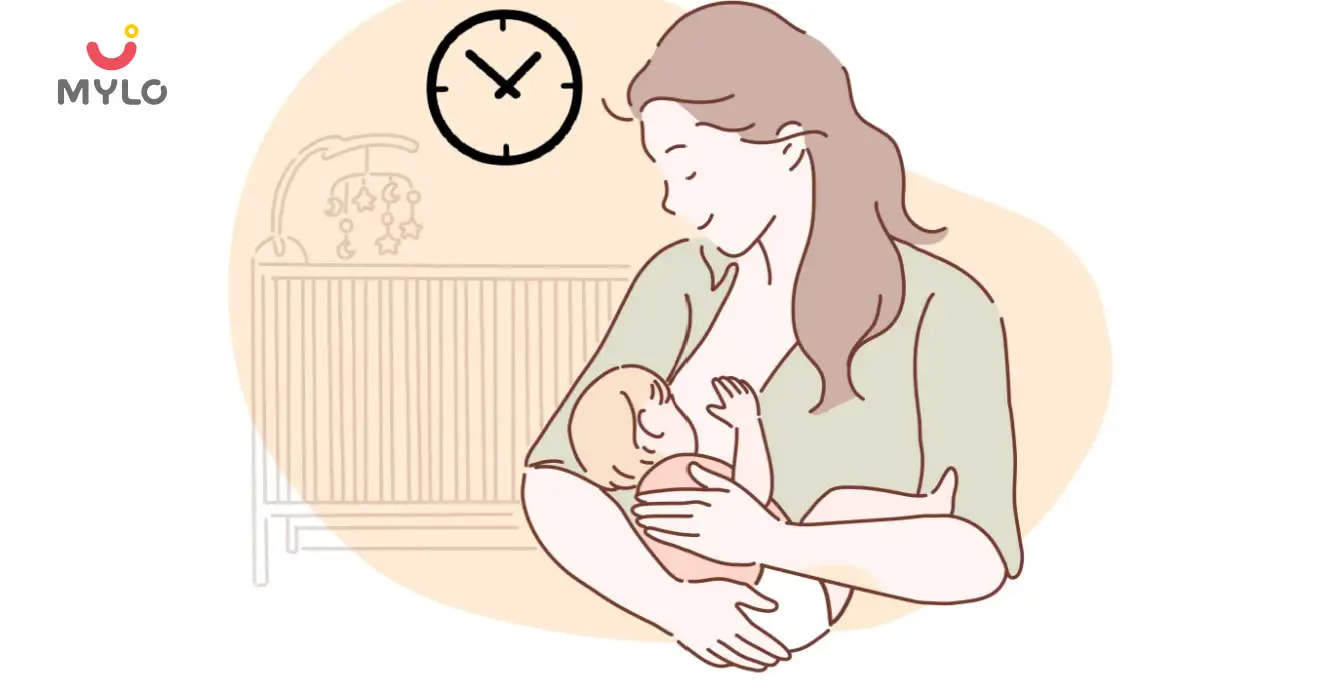- Home

- Feeding Schedule

- Cluster Feeding in Newborn - Complete Guide for Parents
In this Article
Feeding Schedule
Cluster Feeding in Newborn - Complete Guide for Parents
Updated on 3 November 2023
Cluster feeding is when a newborn suddenly starts eating more frequently and in clusters for a while. In this article, we will understand cluster feeding in newborns in detail and discuss its signs, causes, risks, benefits and management.
What is cluster feeding?
Cluster feeding means a pattern of feeding where the baby frequently feeds for a short period, usually in the evening or nighttime. This can happen during the newborn period but can also occur later on in the baby's development. During cluster feeding, the baby may seem fussy and want to be held and fed frequently rather than sleep or play. This is normal and signals that the baby is growing and developing properly.
Mothers must be patient and understand that this behaviour is normal and temporary. It is also a good idea to rest as much as possible and have a good support system during this time. Keep in mind that cluster feeding is also a sign that baby is getting enough milk, and if the baby is growing and gaining weight well, there is no need to worry.
It is always best to consult with a healthcare professional if you have any concerns about your baby's feeding or growth.
You may like: Wondering how to track your baby's feed? Let us help you!
How to identify cluster feeding?
There are a few signs of identifying newborn cluster feeding:
-
Frequent feedings: A baby who is cluster feeding may want to nurse or take a bottle every hour or even more frequently for a period of time, often in the evening or nighttime.
-
Fussiness: A baby who is cluster feeding could be fussy and want to be held longer and feed often, rather than play or sleep.
-
Long feedings: A baby who is cluster feeding may take longer to feed than usual, as they may be taking in more milk.
-
Short naps: A baby who is cluster feeding may take shorter naps between feedings, as they are using more energy to feed.
-
Increase in wet diapers: A baby who is cluster feeding may have more wet diapers than usual, as they are taking in more milk.
It is important to note that these signs can also be caused by factors such as growth spurts, teething, or changes in the baby's schedule. It is always best to consult with a healthcare professional if you have any concerns about your baby's feeding or growth.
Cluster feeding can be a challenging time for parents, especially for new mothers. One must be patient and understand that this behaviour is normal and temporary. It is also a good idea to rest as much as possible and have a good support system during this time.
Why do some babies cluster feed?
Newborn cluster feeding is believed to be the baby's way of increasing the mother's milk supply. The baby's frequent feedings stimulate the release of the hormone oxytocin, which helps the milk flow. The baby's suckling also signals the mother's body to produce more milk. This way, the baby can have enough milk for the next day.
How to deal with cluster feeding?
Dealing with cluster feeding can be challenging for parents, especially for new mothers. Some tips that can help:
1. Try to relax:
Cluster feeding can be stressful, but staying calm and relaxed is essential and can help release the hormone oxytocin, which assists with milk flow.
2. Be prepared:
Stock up on essentials such as diapers, wipes, and snacks, so that you are prepared for frequent feedings.
3. Be comfortable:
Find a comfortable position for you and the baby to make the feedings as comfortable as possible.
4. Be patient:
Cluster feeding is a normal and temporary phase; it will pass.
5. Seek support:
It's important to have a good support system during this time. Reach out to friends and family for help, or talk to other mothers who have gone through the same experience.
6. Take care of yourself:
Eat well, stay hydrated, and get as much rest as possible.
7. Keep an eye on the baby's growth:
Pay attention to the baby's weight gain, diaper output, and overall development. If the baby is growing and gaining weight well, there's no need to worry.
How does cluster feeding start?
Cluster feeding typically starts in the first few weeks of a baby's life, but it can occur at any time during the breastfeeding period. It is more common in the evening or nighttime hours, but it can happen at any time of the day.
You may like: A Complete Guide on Breastfeeding for New Moms
What are the benefits and risks of cluster feeding?
Benefits of newborn cluster feeding:
-
Increased milk supply
-
Better weight gain
-
Better bonding
-
Better sleep
Risks of cluster feeding in newborns:
-
Fatigue
-
Difficulty with latching
-
Overfeeding
-
Difficulty with milk supply



Written by
Roohi Kalra
Get baby's diet chart, and growth tips

Related Articles
How Respiratory Syncytial Virus (RSV) Impacts Premature Babies Differently: What Every Parent Needs To Know
Adverbs: A Comprehensive Guide to help small children learn the usage of adverbs
Expand Your Child's Vocabulary with words that start with X: Easy, Positive, and Engaging Words, Animals, Countries, and Fruits
Unlocking Language Proficiency: The Ultimate Guide to Top 100 Sight Words for Kindergarten and Beyond
Related Questions
Influenza and boostrix injection kisiko laga hai kya 8 month pregnancy me and q lagta hai ye plz reply me

Hai.... My last period was in feb 24. I tested in 40 th day morning 3:30 .. That is faint line .. I conculed mylo thz app also.... And I asked tha dr wait for 3 to 5 days ... Im also waiting ... Then I test today 4:15 test is sooooo faint ... And I feel in ma body no pregnancy symptoms. What can I do .

Baby kicks KB Marta hai Plz tell mi

PCOD kya hota hai

How to detect pcos

RECENTLY PUBLISHED ARTICLES
our most recent articles

Diet & Nutrition
গর্ভাবস্থায় আলুবোখরা: উপকারিতা ও ঝুঁকি | Prunes During Pregnancy: Benefits & Risks in Bengali

Diet & Nutrition
গর্ভাবস্থায় হিং | ঝুঁকি, সুবিধা এবং অন্যান্য চিকিৎসা | Hing During Pregnancy | Risks, Benefits & Other Treatments in Bengali

Women Specific Issues
স্তনের উপর সাদা দাগ: লক্ষণ, কারণ এবং চিকিৎসা | White Spots on Nipple: Causes, Symptoms, and Treatments in Bengali

Diet & Nutrition
গর্ভাবস্থায় পোহা: উপকারিতা, ধরণ এবং রেসিপি | Poha During Pregnancy: Benefits, Types & Recipes in Bengali

Diet & Nutrition
গর্ভাবস্থায় মাছ: উপকারিতা এবং ঝুঁকি | Fish In Pregnancy: Benefits and Risks in Bengali

Diet & Nutrition
গর্ভাবস্থায় রেড ওয়াইন: পার্শ্ব প্রতিক্রিয়া এবং নির্দেশিকা | Red Wine During Pregnancy: Side Effects & Guidelines in Bengali
- ইনার থাই চ্যাফিং: কারণ, উপসর্গ এবং চিকিৎসা | Inner Thigh Chafing: Causes, Symptoms & Treatment in Bengali
- গর্ভাবস্থায় ব্রাউন রাইস: উপকারিতা ও সতর্কতা | Brown Rice During Pregnancy: Benefits & Precautions in Bengali
- Velamentous Cord Insertion - Precautions, Results & Safety
- Unlock the Secret to Flawless Skin: 7 Must-Have Qualities in a Face Serum
- Unlock the Secret to Radiant Skin: How Vitamin C Serum Can Transform Your Complexion
- Gender No Bar: 10 Reasons Why Everyone Needs a Body Lotion
- Unlock the Secret to Radiant Skin How to Choose the Perfect Body Lotion for Your Skin Type
- Top 10 Reasons to Apply a Body Lotion After Every Bath
- Communication in Toddlers: Milestones & Activities
- How to Improve Vocabulary for Toddlers?
- A Comprehensive Guide to Understanding Placenta Accreta
- Vulvovaginitis in Toddlers Causes, Symptoms and Treatment
- A Comprehensive Guide to Understanding Cerebral Palsy in Children
- Bitter Taste in Mouth During Pregnancy: Understanding the Causes and Remedies


AWARDS AND RECOGNITION
Mylo wins Forbes D2C Disruptor award
Mylo wins The Economic Times Promising Brands 2022
AS SEEN IN
















At Mylo, we help young parents raise happy and healthy families with our innovative new-age solutions:
- Mylo Care: Effective and science-backed personal care and wellness solutions for a joyful you.
- Mylo Baby: Science-backed, gentle and effective personal care & hygiene range for your little one.
- Mylo Community: Trusted and empathetic community of 10mn+ parents and experts.
Product Categories
baby carrier | baby soap | baby wipes | stretch marks cream | baby cream | baby shampoo | baby massage oil | baby hair oil | stretch marks oil | baby body wash | baby powder | baby lotion | diaper rash cream | newborn diapers | teether | baby kajal | baby diapers | cloth diapers |






